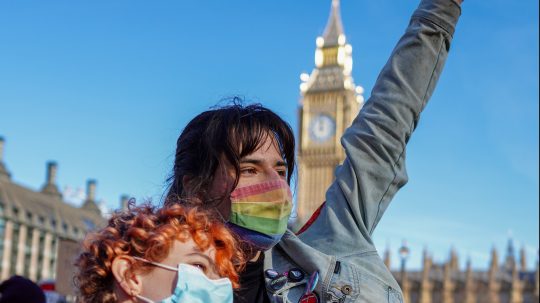When the Equality Act 2010 was first introduced 12 years ago, it was intended to make society “fairer” and “more equal”. The Act banned discrimination on the basis of certain ‘protected characteristics’ – including, age, disability, gender reassignment, marriage and civil partnership, pregnancy and maternity, race, religion or belief, sex, and sexual orientation.
If a person could prove in court that they had been fired by their employer because of their age, for example, this would be considered unlawful and their employer may have to pay them compensation as a result.
However, trade unions and economic justice groups have long argued that the Equality Act ignores a crucial part of what makes Britain unfair and unequal: social class. Researchers say class retains its ‘stubborn hold’ on education, income and home ownership across Britain.
Class-based discrimination is damaging
Gaps between poorer and richer children’s educational attainment are the same as they were 20-years ago, according to a report published by the Institute for Fiscal Studies this month. Social mobility, measured by how much people earn compared with their parents, is falling, says the Sutton Trust. Meanwhile, the gap in home ownership rates between those who grew up in rented homes compared with parents who owned their home has doubled.
“If you are from a working-class family, the odds are stacked against you”, says Kate Bell, head of the international, social and economic rights department the Trades Union Congress (TUC).
“Even with higher qualifications, people from a working-class background still tend to end up on lower pay than those with similar qualifications from a wealthier background,” says Bell, adding, “And class discrimination is not only a source of individual injustice, it is a waste of some of Britain’s best skills and the talent.”
Class discrimination should be made unlawful and should become a protected characteristic under the Equality Act, says Bell. “We need a new duty on employers to stamp out class prejudice once and for all.”
The latest call for class to become a protected characteristic comes from The British Psychological Society (BPS). In July 2022, a report by the BPS suggested that class-based discrimination and prejudice can cause “psychological damage”. From this perspective, the organisation is campaigning for the government to make class a protected characteristic as a “first step”.
“We thought, if the government is serious about improving, or ‘levelling up’, the lives of the public, we really need to ensure that evidence-based policies are in place,” says the report’s lead researcher, Dr Bridgette Rickett, chair of UK’s ‘Psychology of Social Class’ group and head of psychology at Leeds Beckett University.
She has noticed, since the pandemic, there is more public “appetite” to talk about class – especially, during the UK’s cost-of-living crisis. Despite this renewed interest, ‘classism’ – discriminating on the basis of class – is not talked about, she says. “It’s what we call an ‘absent present’ – it’s there and one knows it’s happening, but we’ve derobed of the way of speaking about it.”
How do you measure ‘social class’?
Social class can be measured in the three ways, the BPS says in its report: economic, social, and cultural. It lists measures that employers, researchers and policy-makers are already using. Both ‘objective’ measures, like a child’s eligibility for free school meals, or an adult’s salary, and ‘subjective’ measures, like a person’s perception of their own class or their language, can be used to signify social class.
“It’s no more difficult than what we have in the current Equality Act,” says Dr Rickett, pointing to a case where it has proven difficult to show discrimination on the basis of religion. “But it’s interesting that we feel it’s more difficult.” Indeed, social class is measured in discrimination law in at least 20 European countries.
“Take a lawyer whose father was a miner”, she says. “Their class depends on the measurement used. If measurement is based on their current occupation, then they would be middle class, but if it was based on their parent’s occupation, they would be someone of working class origin”.
Rickett explains that the majority of people are reluctant to say what their earnings or their parents’ earnings are, but they can say what their parents’ occupations were when they were young. “That’s a very strong predictor of education, work and health outcomes throughout our lives,” she says, a sentiment reflected by the Social Mobility Commission. One of the strongest indicators of how we will fare is inherited wealth – when parents have savings or investments they can pass on.
Class complexity
What happens when class intersects with another form of discrimination, like race? According to Dr Rickett, making class a protected characteristic would be a “positive” step for understanding intersectionality, where different forms of discrimination intersect. Right now, people have to “squeeze” themselves into the existing protected characteristics.
As a working-class woman, she says, she could only claim discrimination on the grounds of sex, but if she knew that losing out on a job was because of both her class and sex, then she could not show that under the present law. This “obscures” intersectional discrimination, which is important for recognising how other characteristics, like race, strongly interact with class, Rickett says.
However, class can be “complex”, she adds. Access to economic capital is one component, but another is cultural capital. “What’s the legitimacy of our interests, our preferences, our cultural knowledge according to the most powerful people in our society?” she asks.
Rickett says the “poshness test” exists in most elite occupations in UK society. It applies to cultural interests, but also the cultural value attached to our family, school or even our accent.
She describes people from working class origin who have won millions in the National Lottery as feeling socially and culturally alienated in their new middle class lifestyles. “They reported that they really struggled to be accepted. That in the local pubs and shops, they were treated differently and their children were treated differently at school.”
Class is something that is hard to transcend. According to Rickett: “When you are from a working class background and gain access to elite institutions, like Oxford University, it can be painful and difficult.” People have told her they feel disconnected from their family and their values.
“When people say: ‘let’s all be socially mobile’. It’s just simply not as straightforward as that.”
But still, she argues social class is no more complex to measure than other forms of discrimination. “The vast majority of the UK public know very clearly what class they are and know that they’re treated accordingly,” she adds. “The vast majority know they aren’t socially mobile.”
Counting class
The Social Mobility Commission has a toolkit for employers to measure social class. According to the BPS report, almost 40 per cent of employers are already measuring social class in some form in their employment practices.
However, because class is not a protected characteristic in law, there is no legal obligation on employers to measure it. What is needed is a robust way of accounting in recruitment and employer practices, she says. If someone did not get a job because of their class, just like religion or gender, they would need to be able to evidence that in a court of law, through scrutiny of recruitment documents, other candidates and job criteria.
The Public Sector Equality Duty on socio-economic status, which requires a public body, such as the NHS or local government, to design policies with “due regard” for reducing the “inequalities of outcome which result from socio-economic disadvantage”, has not been properly implemented, according to a parliamentary committee.
“Successive governments have failed to commence this duty,” says Dr Koldo Casla, director of the Human Rights Centre Clinic at Essex University. “It is nonetheless binding in Scotland and in Wales.”
He says that, though this only applies to public authorities and not private employers, its implementation would be a “significant step forward”.
Dr Rickett agrees, adding that it would help measure class disparity in public service use and outcomes, such as why poorer pregnant women are more likely to die during or after childbirth.
Reviewing the Equality Act
Despite calls for a review of the Equality Act from Dr Suriyah Bi and concerns raised in parliament that the Act has ‘not made a difference to disabled people and that the government has no plans to change the law at present’.
When Dr Rickett spoke with government representatives, even those who were on board said they did not have the time or “stomach” to reform the Equality Act. However, Conservative party leadership contender, Rishi Sunak has stated that he wishes to review the Act, to stop “woke nonsense” from“permeating public life”.
Despite stating that he has no interest in entering into ‘culture wars’, Sunak has said he is committed to “end the brainwashing, the vandalism and the finger pointing” and “protect British freedoms”, if elected by his peers. Despite Sunak saying that if he will review the act if he were to become prime minister, it seems he would look to limit the act rather than build on it to include class as a protected characteristic.





